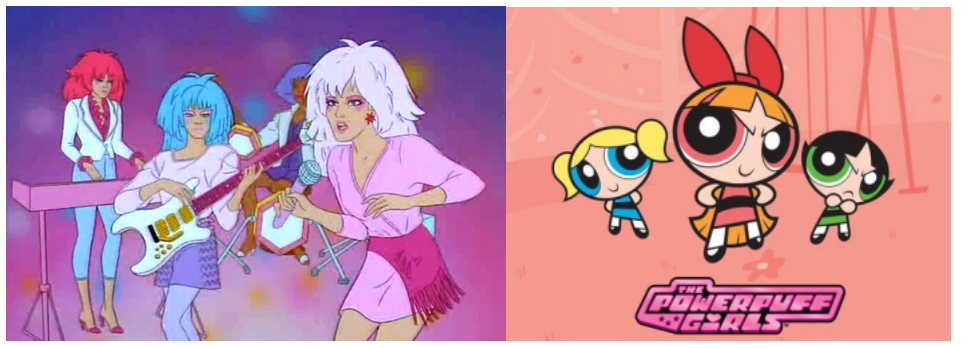Media shapes people. No matter what one might say about the means to resist the effect of the TV propaganda and the way to retain one’s own opinion, TV shows that people watch regularly, and especially the ones that they used to watch regularly as kids, affect or have affected their vision considerably.
Despite the fact that the effect of the late 80s and early 90s young girls oriented animated series were neutral at best and harmful at worst, some elements of feminism started shining through, which manifested the era of animated movies emancipation.
A comparison of such shows for young girls as Jem and PowerPuff Girls will display in a very graphic manner how giant a leap animated movies industry has made in a relatively short amount of time.
While in Jem, the key female leaders were replaced with stock Barbie-style characters and personalities of hair spray cans, The PowerPuff Girls, a show that came out only a decade later, featured a team of colorful and active characters that were not afraid of being funny and even ridiculous, with a unique comedic edge to the traditional superheroes formula and an original representation of interactions between these characters.

The examples in question have been chosen as the key subject of the study, sine they are truly fascinating specimens in the evolution of an image of a woman in media. Each of them is clearly a product of its time, there can be no doubt about it.
However, it is not the ability of a movie to send a topical message that is being considered. What strikes most about both movies is how each of them takes female stereotypes and transforms them with a unique result, Jem reinforcing them, and PowerPuff Girls destroying them completely.
Both movies use practically the same stock tools for creating their characters – in fact, even the pink-and-pastel color cast seems practically the same in each series.
The series mentioned above will be used to study the way in which tools that were used to enhance the stereotypes of gender roles in Jem were utilized in the PowerPuff Girls to destroy these stereotypes of the colonial/gender system.
YouTube and the site called RetroJunk will be used as the key sources for retrieving the related media.
To analyze the approaches chosen by each animated series for displaying their female characters, the theory of social contract will be used. One of the relatively neutral ones, it will help understand where the animated movies succeeded in promoting feminist ideas, and what they have desperately failed at.
To be more exact, Rousseau’s concept of equality will be used as the basis for addressing the major problems of the shows. Based on the idea that all men are equal, no matter what their race, ethnicity, gender or religious beliefs are, Rousseau’s theory presupposes that equality is natural and, therefore, intrinsic.
In other words, Rousseau’s theory is based on the key postulates of the Theory of Social Contract. Heralding free will as the universal truth, Rousseau also outlines the welfare of the whole, thus, creating a major dent in his theory.
Indeed, seeing how the welfare of an individual does not necessarily coincide with what is required to attain the welfare of the society, the idea of pursuing the benefit of an individual through the collective effort seems rather odd.
Nevertheless, Rousseau’s influence on the evolution of the concept of people’s indefeasible rights and freedoms is undeniable. In addition, Rousseau provided his own concept of a perfect state, in which every individual could be provided with their irrefutable rights and freedoms.
More to the point, Rousseau’s ideas regarding people’s liberties were not limited to social issues; he was also concerned with the major political problems, including the issue of state sovereignty and the place of an individual within a sovereign state.
The sovereignty definition, in fact, was the factor triggering the above-mentioned conflict between the concepts of Rousseau’s theory. Rousseau argues that between communitarianism and liberalism, the golden mean and the perfect environment for the development of an individual exists.
The fact that each of the series of the PowerPuff Girls stands the Bechtel test, whereas some of the Jem episodes do not, like the Midsummer Night’s Madness, will be also evaluated based on the key concepts of Rousseau’s theory.
One could argue that comparing the two animated series is not quite adequate, since they clearly belong to a different genre.
While technically, this is a valid point, considering the two shows closer, one will inevitably understand that the comedy, had much more rights to exploit the stereotypes, did a much better job than the genre, which should have handled the idea of female rebels better by default.
More to the point, Jem did not even try to eliminate some of the common stereotypes, like excessive use of fan service in most of the show.
Therefore, the failure of Jem and the following success of the sketchy, comedic PowerPuff Girls series as a truly unique phenomenon deserves to be considered through the lens of Rousseau’s theory.
Works Cited
90s Trends: February 2012. n. d. Web.
Jem and the Holograms. n. d. Web.